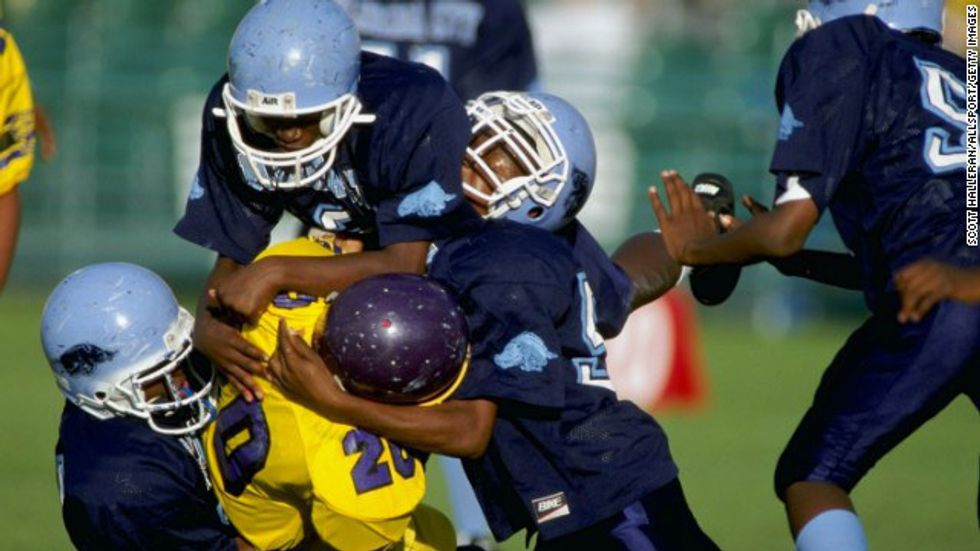If you’re an NFL fan, a football fan in general, or just someone who occasionally listens to sports sections of the news, then you at least have heard the term “CTE” in the recent months. The spread of this acronym, some common misconceptions on how someone can “end up” with this disease, and parental instinct has caused a recent trend in the phrase: “My kid isn’t going to be playing football,” or, “I don’t care if they like football, it’s much safer for them to play soccer, baseball, or be in band.” It’s heightened the fear and claims of football being too dangerous for beloved children to participate in. I’m here to explain why you should not discourage your children from playing sports – even if it’s as dangerous as football. I’m also going to explain why and how football can be made less “dangerous” for your kids.
In case you haven’t heard about it (or you have and just don’t know much about it) CTE stands for Chronic Traumatic Encephalopathy and it is found in a lot of athletes who have had repeated head trauma (such as concussions). CTE is a progressive degenerative disease of the brain that includes the build-up of an abnormal protein that’s known as “tau” and the changes don’t typically show up right away. In fact, they can show up decades after the last brain trauma. With the build-up of this protein, a lot can happen to the human brain such as memory loss, confusion, impulse control problems, impaired judgment, aggression, depression, and even progressive dementia. This, of course, is all pretty scary. I can see how if you only know these facts you would pull your kid out of the sport right away or tell your kid that they can’t play.
In the last four-plus years, it has been an uphill battle with the NFL to convince the organization that head injuries need to be taken more seriously than they have been in the past. There have been lawsuits over former players suing the organization because they weren’t given the proper treatments then or now on brain issues that they believed were caused from multiple concussions in their time playing for the NFL. One of the bigger cases: San Diego Chargers’ great Junior Seau was found dead at his home after a self-inflicted gunshot wound. Usually, we hear these stories and it ends with “to the head,” however in Seau’s case he shot himself in the chest because he wanted scientists to look at his brain. He knew something was wrong and he wasn’t getting the help he needed from his former employer. After careful examinations from neuropathologists, it was determined that Seau’s brain showed multiple signs of the disease that ultimately led to his suicide.
The facts are all there, the facts are all written out, and it’s scary to think that there isn’t a whole lot we truly know about CTE. There hasn’t been enough research and in sports like football, it’s seemingly unavoidable. It would be much easier (and more comforting) to know that your kid isn’t playing such a dangerous sport, right? At family dinners, I’ve heard my family members and family members of others discuss the fact that they simply would not allow their child to continue in such a sport- they could play soccer or baseball, instead. The truth of the matter, though, is the fact that concussions and brain trauma can happen in any sport. Soccer players head the ball all the time and soccer is one of the most physical sports with one of the highest rates of concussions. Baseball or softball seems pretty safe... there’s no contact, right? Wrong. Players (especially pitchers) can end up with a ball right off the bat in their face pretty easily resulting in serious injuries and even concussions. It’s a thing that happens in every sport, not just football. Now, this isn’t me trying to convince you that all sports are bad and you need to remove your child from them as soon as possible. Hang in there with me for just a second:
What it comes down to is the fact that kids need to be coached properly. Kids need to be taught and shown how to take care of their bodies before stepping onto a field or court, while playing, and after playing. They need to know the scary facts of the outcome of certain injuries, they need to know how important it is to take care of their body – especially their heads. When it comes to football, be sure that your kid’s coach is participating in positive coaching; teaching the players to play heads-up football is a huge first step at eliminating some of the instances that concussions can occur in. Sports are an active part in shaping how kids grow, learn to be a member of a team, and encourage such important moral and social skills that they can carry with them throughout the rest of their lives. At the end of the day it’s not about discouraging them from playing a sport they love, but instead more about educating them on what it is that we know right now and protecting their body by playing right without taking shortcuts on their own safety.
There’s still a lot of research to be done when it comes to CTE and it is a very real, very scary thing that is happening in a lot of retired athletes, but I encourage you to give your kids the chance to love a sport that can do so much for them. Teach them the fears and possibilities, but also show them that as long as they stay educated and play right they can still play the sport that they love safely and grow immensely from it.




















